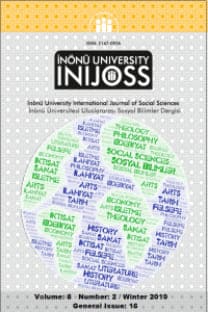REFLECTIONS OF CULTURAL CONCEPTION OF SELF IN ZADIE SMITH’S THE AUTOGRAPH MAN
Öz
Antropologists
think that culture deeply affects people and shapes selves. It is a known fact
that cultural themes have a great influence on the conceptions of self,
emotion, child development, mental disorders and frames of individuals’
cognitive development. For J. Greg Miller, cultural content should be analyzed
as an essential influence on the patterning of psychological structures and
processes. So, there is a close relationship between the self and cultural
discourses. Michel Foucault points out that cultural forms shape subjectivity
in a socially constructed manner. Individuals having diverse inheritances due
to culture are in the center of identity problems when a person’s ethnicity is
categorized. In The Autograph Man, Alex-Li Tandem,
buys and sells autographs for a living. Collecting the signatures of famous
people is his favourite occupation. As the son of a Chinese father and Jewish
mother he has a mixed blood and a complex inheritance. He lives alone because
his father is dead and his mother has moved to the country. He does not mind
his girlfriend of ten years, Esther, any more. He is always drunken and does
not refrain from smoking pot with his childhood friend Adam in his own life’s
complexity. In the novel difference between Jewish and goyish things is
emphasized, and naturally it creates a perceptual field for the concepts of
subjectivity and self. Thus, Zadie Smith tries to describe Alex-Li’s place in pop culture
both as an autograph man clinging to a life full of irony and also a character
having complex inheritance and she gives an oppurtunity to the researchers to
study the
Autograph Man in terms of the importance of cultural content
in the formation of one’s social identity with references to cultural themes in
a Foucauldian approach.
Anahtar Kelimeler:
cultural content, subjectivity, self, identity, Alex-Li, Foucault, care of self
___
1. Allen, Dougles.(1997) . Culture and Self: Philosophical and Religious Perspectives, East and West. Boulder: West View Press.2. Best, S. Kellner, D. (1998). Postmodern Teori. (trans., Mehmet Küçük). İstanbul: Ayrıntı.
3. Besley, Tina. (2007). Subjectivity and Truth: Foucault, Education, and the Culture of Self. New York: Peter Lang Publication.
4. Cooper, Cary L. Pervin, Lawrence A.(edts.). (1998). Personality. London: Routledge.
5. Foucault, Michel. (1999). Kendini Bilmek (Söyleşi: Huck Gutman, Patric H. Hutton). (Çev. Gül Çağalı Güven). İstanbul: Om Yayınevi.
6. Foucault, Michel. (2000). Etiğin Soybilimi Üzerine Sürmekte olan Çalışmaya İlişkin Bir Değerlendirme, Özne ve İktidar. (Çev., I. Ergüden, O.Akınhay). İstanbul: Ayrıntı.
7. Holland, Dorathy C. (2003). Identity and Agency in Cultural Worlds. Cambridge: Harward University Press.
8. Hulür, Himmet. (2009). Faşist Olmayan Varolma Biçimlerinin Olanakları Üzerine: Michel Foucault’da Normalleşme, Benlik ve Etik. Erzurum: Ekev Akademi.
9. Lock, John. (2005). Of Identity and Diversity. Kim Atkins.(ed.), Self and Subjectivity. Oxford: Blackwell Publishing.
10. Mansfield, Nick. (2000). Subjectivity: Theories of the Self From Freud to Haraway. New York: NYU Press.
11. Nehemas, Alexander. (2002).Yaşama Sanatı Felsefesi. (Trans., Cem Soydemir). İstanbul: Ayrıntı.
12. Sedikides, Constantine. Brewer, Marilynn B.(eds.) (2001). Individual Self, Relational Self, Collective Self. Philedelphia: Psychology Press.
13. Skeggs, Bewerly. (2004). Class, Self, Culture. London: Routledge.
14. Smith, Zadie. (2002). The Autograph Man. Great Britain:2002.
15. Stroizer, Robert M. (2002). Subjectivity & Identity: Historical Construction of Subject &Self. Detroit: Wayne University Press.
16. Taylor, Diana. (ed.) (2010). Michel Foucault: Key Concepts. United Kingdom: Acumen Publishing.
17. Vincent, L. Wimbush. (2002). Asceticism. New York: Oxford University Press. Electronic References:
18. Faucault, Michel. (1988).Technologies of the Self. Luther H. Martin, Huck Gutman, Patrick. H. Hutton (Eds.), Technologies Of The Self A Seminar with Michel Foucault (p.17-49). London: Tavistock Publication.
19. http://monoskop.org/images/0/03/Technologies_of_the_Self_A_Seminar_with_Miche l_Foucault.pdf Access date: 20.12.2015
20. Luna, Wendyl M. (2009). M. Foucault & Ethical Subjectivity. Volume 3 Number 2, 139-146.
21. http://www.kritike.org/journal/issue_6/luna_december2009.pdf.access.accessdate 30.08.2015.
- ISSN: 2147-0936
- Yayın Aralığı: Yılda 2 Sayı
- Yayıncı: İnönü Üniversitesi
Sayıdaki Diğer Makaleler
ECOLOGICAL CITIZENSHIP IN THE POEMS BY JOY HARJO
NATURE, CRITICISM OF THE WORLD, AND LOVE IN “DOVER BEACH” AND “LOVE AMONG THE RUINS”
FROM A JOURNEY OF INNER STRUGGLE TO A CATASTROPHE: ^ HENRIK IBSEN’S HEDDA GABLER
TOPLUMSAL YAPININ OLUŞUMU: BİLİM, DİN VE TOPLUM ARASINDAKİ İLİŞKİLER
A KOHUTIAN APPROACH TO “A BIT OF SINGING AND DANCING” BY SUSAN HILL
BİLGİNİN İMKÂNI VE TEMELCİ GÖRÜŞ
CLOUD NINE IN RELATION TO EPIC THEATRE
DUAL NATURE OF VIOLENCE AND DIVIDED SELF OF MAN IN THE POEMS OF TED HUGHES
